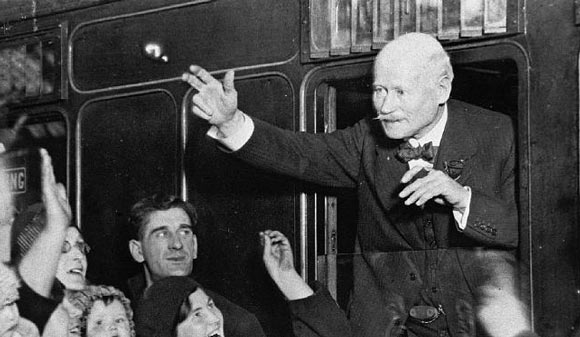Frank Hornby invented “Hornby Model Railways”, “Dinky Toys” and “Meccano”
Frank Hornby was one of the most famous British toymakers of the 20th century, and is widely remembered for his three most popular toy lines i.e. Hornby Model Railways, Dinkys and Meccano. Hornby was born in 1863 in Liverpool, England. He left school before the age of 16 and worked at his father’s business as a clerk. In 1887, he married a school teacher named Clara Walker Godefroy with whom he had three children – two sons and a daughter. After his father’s death and the subsequent closure of his business, Hornby started working as a bookkeeper at a meat business.
His interest in toy making initiated when he started to design and create toys for his sons to play with. He used sheet metal and built trucks, bridges, cars etc. While he was crafting these, he realized that if he could built interchangeable parts, then one set of pieces could be used to build any number of toys. He made holes in the pieces to fit in the nuts and bolts to join the parts together, and this also acted as an axle or pivot to arrange the pieces in any shape or form; even seemingly complex structures could be built using the same parts.
Hornby fine tuned his design and finally considered it ready to be marketed. At first his toys did not attract much attention in the market because they weren’t very attractively built and Hornby could not find a willing manufacturer. Still, he felt there was merit in his idea and he patented his idea by borrowing five pounds from his employer David Elliot. Hornby patented his invention in 1901 and named it “Improvements in Toy or Educational Devices for Children and Young People”. It was eventually his employer Elliot who encouraged him to continue working further. Elliot even allowed Hornby to use the premises next to the office to set up a work space. Thus, Hornby and Elliot became partners.
They changed the name of the business to “Mechanics Made Easy”. The business was started in 1902 and received support from Professor Henry Selby Hele-Shaw, the Head of Engineering at Liverpool University. At first sales were slow to take off. The first construction sets only had sixteen parts along with instructions about how to assemble them to make different models. In the first year after opening for business, they sold a total of 1500 sets. This number slowly rose, and in 1906, they made a small profit for the first time. As the business grew, so did the demand for parts. Hornby’s original supliers found it difficult to meet the rising demand. So Hornby quit his job with Elliot and acquired bigger premises to set up his factory.
He formally incorporated the company in 1907, in an effort to raise more capital. Elliot had decided not to join the new company, so Frank Hornby became the sole owner. He again changed the company name, this time to “Meccano Ltd” which is how it is remembered today. He began manufacturing his own parts in the factory, rather than outsourcing them to other suppliers. Meccano toys were extremely popular due to their attention to detail and sound quality. As sales began to soar, Hornby expanded the business all over England, exported to several countries and even set up factories in paris and Berlin. Other than Meccano sets, he also manufactured railway sets and dinky cars, both of which were also bestsellers.
In 1931, Hornby briefly entered politics and was elected as a Member of Parliament. He launched a magazine named “Meccano Magazine”. At the time of his death he was a millionaire and owned a mansion and a limousine. His 150th birthday was celebrated in Liverpool and Brighton on 15 May 2013 because of his remarkable contribution to mechanics without ever having received any formal training in the field.
